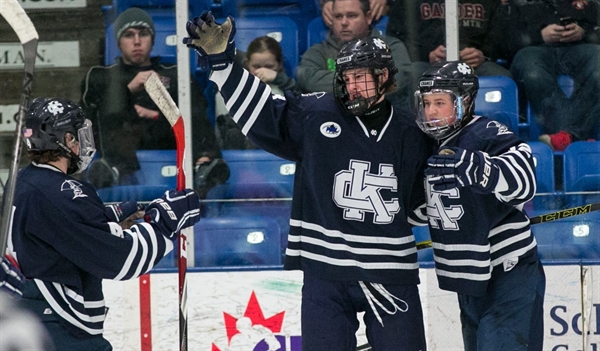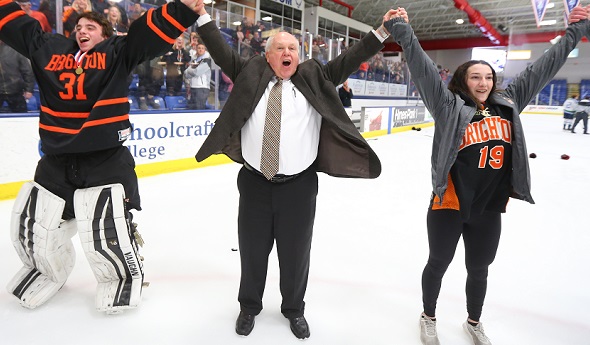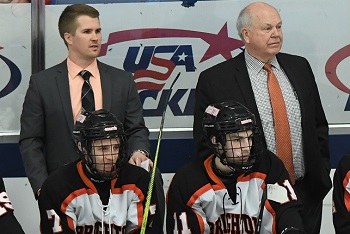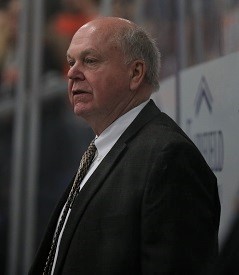
Cranbrook Kingswood Caps Comeback
March 14, 2015
By Bill Khan
Special to Second Half
PLYMOUTH — No one is immune from the disappointments of playoff hockey, not even those who play for a perennial powerhouse like Bloomfield Hills Cranbrook Kingswood.
Three years ago, Cooper Stahl and Austin Alger were freshmen on a Cranes team that outshot Marysville 55-19, only to lose a 2-1 overtime shocker in the Regional Finals.
Last season, they were juniors on a Cranbrook Kingswood squad that fell 3-2 in the MHSAA Division 3 Quarterfinals to an upstart Farmington squad, which was outshot 62-15, but used that upset as a springboard to an unlikely championship.
The common theme for the 2013 and 2015 Cranbrook Kingswood teams is how they responded to adversity, bouncing back from rare early exits in the postseason to add to the school's record total of MHSAA championships.
The count is now at 17 after the Cranes' dominating performance in a 4-0 victory over Houghton in the Division 3 Final on Saturday at Compuware Arena. Trenton ranks No. 2 on the list with 14 championships.
"They're the top team in Division 3, and have been," Houghton coach Corey Markham said. "They're the measuring stick. ... They're as good as anyone in the state. They're not just a good Division 3 team, they're as good as anyone in the state, and they've proven that."
Cranbrook Kingswood has a 17-2 record in MHSAA Finals, winning in its last nine appearances, but — despite impressions to the contrary — the Cranes don't always make it to the final day of the tournament.
"It really helps motivate us," Stahl said of the two playoff losses during his four-year career. "We've seen both spectrums, the highs and lows. Throughout my four years here, every day in practice and off ice, everything we do, we had both of those feelings in our mind. We wanted the good one we experienced today."
Like his brother Alex two years earlier, forward Austin Alger spent his senior year working to go out on top after a crushing end to his junior year.
"After getting knocked out against Farmington last year, the guys were on a mission this year," Alger said. "It was easy with the seniors. There were 13 leaders on the team."
The Cranes outshot Houghton 50-13, but they know that shots alone don't win hockey games when the opposing goalie morphs into a brick wall.
Cranbrook Kingswood (25-2-4) didn't allow Houghton senior Marcus Gloss to establish control of the game, peppering him early and coming away with a 3-0 lead after one period.
Mason Schultz buried a backhanded rebound just 42 seconds into the game to open the scoring. By the middle of the first period, the Cranes had a three-goal cushion, with Cole Adaskaveg knocking home a rebound at 6:38 and Blake Rogow scoring from the blue line at 8:09.
 "Getting one early just really calms the nerves for someone who hasn't played at Compuware before, like a freshman who doesn't have that much playoff experience," Stahl said. "It helps settle everyone down to get one goal early and play the rest of the game the way we usually do."
"Getting one early just really calms the nerves for someone who hasn't played at Compuware before, like a freshman who doesn't have that much playoff experience," Stahl said. "It helps settle everyone down to get one goal early and play the rest of the game the way we usually do."
It was a shocking start for Houghton, which allowed only four goals in its five postseason games, and never more than one.
"They jumped on us quick," Gloss said. "I'm not quite sure I was as ready as I should have been. I didn't expect such a quick start. It's tough when they're on you so fast."
Houghton's big chance to get back into the game came at 15:12 of the first period when C.J. Regula of the Cranes received a five-minute major for boarding. The game was a stalemate during that extended power play, with both teams getting one shot on goal.
The Gremlins (24-5-2) wouldn't get another power play until the game was virtually out of reach at 4-0 midway through the third period.
"That was demoralizing, it really was," Markham said. "You think being down three that this is our chance, you get one, maybe two in those five minutes. When we didn't score in those five minutes, it was a little blow. We never just quite got that spark. We didn't have that spark to give us a little pep, a little jump in our step."
After allowing three goals on the first 12 shots, Gloss stopped the next 25 he faced to give Houghton a glimmer of hope for a comeback.
The Gremlins' best scoring chance of the game came early in the third period, when Reid Pietila pounced on a loose puck on a rush and nearly slipped it through the pads of goalie Spencer Applebaum, who looked behind him to see if the puck was in the net.
It was the toughest save in a 13-save shutout for Applebaum, who was also the goaltender when Cranbrook Kingswood beat Sault Ste. Marie to win the 2013 title.
"It was a two-on-two," Applebaum said. "The first guy kind of threw it toward the net. It got deflected in front. The second guy, I saw him out of the corner of my eye. I slid over and he shot it five-hole. I didn't know if I had it, but it was stuck under my pad, probably less than a foot away from the goal line, so I barely got there."
"I tried to slide it under him, but he made a good save," Pietila said. "I try not to be too hard on myself, but it's kind of hard in this situation."
Not long after Applebaum's save, the Cranes essentially put the game away on a power-play goal by Regula with 13:05 left in the game.
"We got a couple of good bounces in today's game," Cranes coach Andy Weidenbach said. "The goalie gave up a couple rebounds and the bounces ended up on our stick. Sometimes they go your way, sometimes they don't. Today the bounces seemed to go our way, and we were able to capitalize on at least three rebounds."
Houghton is 1-4 in MHSAA Finals, its victory coming in 1982 against Flint Powers Catholic. The Cranes are 3-0 in the postseason against the Gremlins, winning 6-5 in the 1979 Class B Final and 3-2 in double overtime in the 1997 Class B Semifinals.
PHOTOS: (Top) Cranbrook Kingswood players celebrate during Saturday's Division 3 Final win. (Middle) The Cranes' Sean O'Leary works to move the puck ahead. (Photos by Andrew Knapik/Southgate.)

Brighton Coach's Impact 'Immeasurable'
By
Tim Robinson
Special for MHSAA.com
October 7, 2020
By Tim Robinson
Special for Second Half
Paul Moggach has never been much for looking back.
 And as he begins his first season away from the Brighton hockey program in more than three decades, he’s still looking ahead.
And as he begins his first season away from the Brighton hockey program in more than three decades, he’s still looking ahead.
“I’m thinking about what I’m going to miss more than the mark I left,” he said in a phone conversation last week. “I guess I enjoyed so much of the time I had, the opportunity to coach at Brighton, I’m thinking more how I fill the time and the things I'll miss.”
Moggach (pronounced MUG-uth) retired as Brighton’s coach this past summer after 25 seasons and having led five teams to MHSAA Division 1 championships. He compiled a record of 466-172-47 during that period.
But that’s not what he remembers most, nor why he wants people to remember him.
“I would like them to remember the teams and players who played for me and my assistants, more than me,” Moggach said. “We have so many blessings and opportunities in our lives, and hockey was one for me and hopefully for the players and assistants I worked with.”
One of those assistants was Kurt Kivisto, who joined the Bulldogs originally as a team manager more than 20 years ago and was a player at Brighton. He eventually won a national championship at Michigan State before rejoining the program as an assistant coach a decade ago.
“The No. 1 thing I’ll take from him is sticking by your beliefs and not sacrificing those beliefs for the team,” said Kivisto, who was named Moggach’s successor in September. “He sticks by those beliefs and ... he’s not willing to sacrifice that even if it could hurt the team. The character and integrity he has, how he treats people with fairness and what he believes is right is the biggest thing I’ll take.”
A stepson, Damon Whitten, played for Moggach at Brighton and at MSU before becoming an assistant coach and eventually the head coach at Lake Superior State, where he is in his eighth season.
Asked about Moggach’s impact at Brighton, Whitten said, “I’m not sure you can measure it. Your mind goes to the hockey players who have come to Brighton, and that’s a big part. But I think it goes beyond that. The money they’ve raised over the years for different families in need, for example. He’s had a big impact, and the players he had were a big part of that, but it goes well beyond that, and he did it the right way. Thirty-plus years (in the program), and I’m not sure you can count more than a handful of times where he made a bad decision or handled things poorly. He did things the right way, every day, all of the time, and I think it’s why he was so successful for so long.”
 The team’s charitable works were mostly kept under the radar – Moggach’s reasoning being his players had been given much, it was their turn to give back, and he didn’t want people thinking they did those things for publicity.
The team’s charitable works were mostly kept under the radar – Moggach’s reasoning being his players had been given much, it was their turn to give back, and he didn’t want people thinking they did those things for publicity.
Moggach joined Rick Bourbonais as an assistant at Brighton in the mid-1980s, then switched roles with him for the 1996-97 season.
He realized Brighton’s potential in the 1992-93 season, when the Bulldogs upset perennial state power Trenton in the Class A Quarterfinals before losing to Detroit Catholic Central in a Semifinal.
“That, to me, said, at least in my mind, that we can do this,” Moggach said. “It’s not impossible.”
He slowly began to build the program, getting good players and a schedule that would challenge them.
“You get the players by building a good culture,” he said. “Back in the day, when I started, we weren’t very disciplined and our league wasn’t very disciplined. So I think we realized we had to build that, and I could have an influence on building that in Brighton.”
Along with the culture, Moggach looked for an edge whenever he could find it. He was talked into making a trip to the Keweenaw Peninsula by one of his player’s parents, and found enormous benefits for his team, both competitively and in team bonding.
“It’s a lot about the little things we do,” he said, “that we find joy in, and create those opportunities. Creating the little moments really can build to bigger moments. We played capture the flag one day in about two feet of snow.
“Almost killed them,” he added, chuckling. The exhausted players didn’t have much left for the game that night, but spending time together for four days in a bus and hotel room always brought the team closer on and off the ice.
That first UP expedition also led to more teams making the trip, for team bonding and a glimpse of a part of the state, and themselves, they might never have seen otherwise.
“We didn’t do that for long,” he said. “But we always came back saying we were better together because of that experience.”
Bob Nelson had three sons play for Moggach, and Nelson’s wife, Kris, was president of the team’s booster club during their involvement over nearly a decade in Brighton hockey. Nelson also coached the program’s younger players for five seasons.
“We got to know the Moggachs really well,” he said. “It was a good experience, both as a coach and as a parent as well.”
Moggach introduced other things, including an emphasis on nutrition and off-ice training, that players resisted at first until they saw the benefits.
 He savored conversations with referees and opposing coaches before the games and even the occasional reporter after games.
He savored conversations with referees and opposing coaches before the games and even the occasional reporter after games.
But his first priority was the players. At times he would erupt in practice at a player or, more commonly, the team, and the boys soon learned to hear the message, not the volume. But for a couple of seasons, they also wrote some of his wilder statements down in a notebook after practice.
One year, they read some of them at the banquet, and after each one, Moggach’s wife, Sharon, would look at him and ask, “Did you really say that?”
Moggach would laugh and confess to remembering he had actually done so, then laughing.
“He knew part of what made the program good was his relationship to the players,” Nelson said. “If it was a good time, he wanted to enjoy it, even at his own expense at times.”
Moggach has staying in the background this offseason, letting Kivisto shape the team.
Asked if he were willing to fully switch coaching roles, as he and Bourbonais did a quarter-century ago, Moggach laughed.
“No,” he said emphatically. “Rick wasn’t in his 70s when we made the switch. Kurt needs his time. I’ll be there if he needs me.”
Moggach, who is 74, still works fulltime as the University of Michigan’s director of risk management.
He plans to spend more time with his wife and watch his grandsons play hockey, as well as catching some Lake Superior State games.
“I was really blessed to have Rick and Brownie (longtime assistant Mike Brown) along for the ride, and then to get Kurt involved,” Moggach said. “They weren’t the only ones, but they were the kids for me.
“The other thing is the support from the Brighton (High School) administration, the teachers, and our community. There are more people to thank than I could ever bring up. I do think that, all together, it was a great run. It couldn’t have been any better.”
PHOTOS: (Top) Recently-retired Brighton hockey coach Paul Moggach celebrates the 2018 Division 1 championship game win over Saginaw Heritage at USA Hockey Arena. (Middle) Former player Kurt Kivisto, left of Moggach during the 2018 Semifinal win over Detroit Catholic Central, served as an assistant before assuming the head coaching job in September. (Below) Brighton's 2018 championship was its fifth under Moggach. (Photos by Hockey Weekly Action Photos.)

